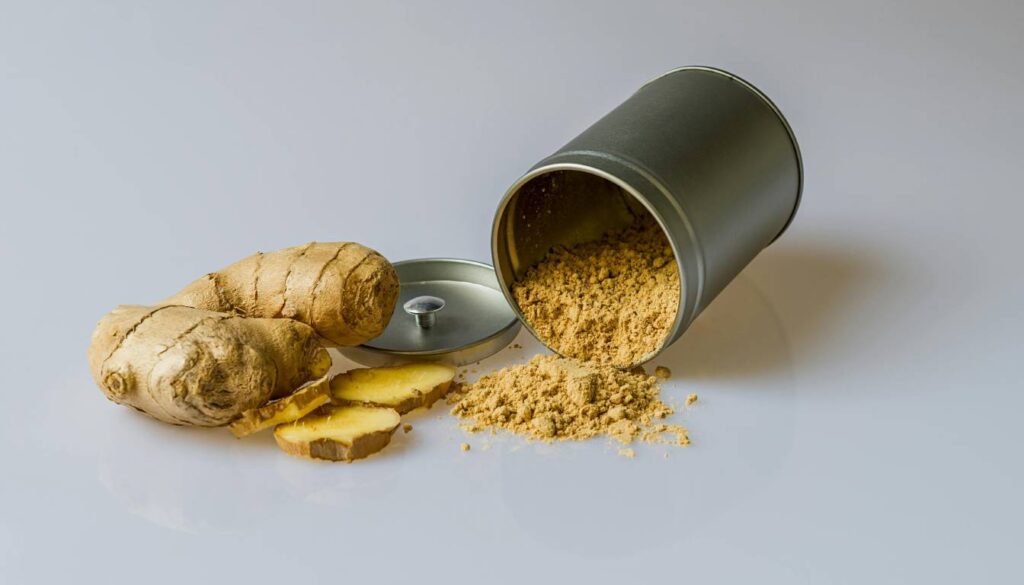For centuries, herbs have been used to alleviate menstrual discomfort. As someone who has experienced the discomfort of menstrual cramps, I understand the need for effective pain relief. While there are many over-the-counter medications available, some individuals prefer natural alternatives. Herbal remedies for menstrual cramps can be an excellent option for those seeking relief without relying on traditional painkillers.
There are many different herbs that have been used to relieve menstrual cramps. For example, ginger has anti-inflammatory properties and can help reduce the intensity of cramps. Similarly, cinnamon has been shown to reduce prostaglandins, which are responsible for causing cramps. Other herbs like chamomile and fennel can help relax the muscles in the uterus and reduce pain.
It’s important to note that while herbal remedies can be effective, they may not work for everyone. It’s always a good idea to speak with a healthcare provider before trying any new remedies, especially if you have any underlying health conditions or are taking medications. Additionally, some herbs can interact with medications or cause side effects, so it’s important to do your research and use caution when trying new remedies.
Causes of Menstrual Cramps – Herbal Remedies for Menstrual Cramps
Menstrual cramps are a common problem experienced by women during their menstrual cycle. They are usually felt as a dull ache or sharp pain in the lower abdomen, back, or thighs. The pain can range from mild to severe and can last for a few hours or several days.
Hormonal changes
Hormonal changes during the menstrual cycle play a significant role in causing menstrual cramps. The uterus contracts to shed its lining during menstruation, and this process is controlled by hormones called prostaglandins. Prostaglandins cause the uterus to contract more strongly, leading to more severe menstrual cramps.
Uterine Contractions – Herbal Remedies for Menstrual Cramps
The uterus contracts during menstruation to shed its lining, and these contractions can cause pain and discomfort. The pain is usually felt in the lower abdomen or back and can be accompanied by aching or throbbing sensations.
Other conditions such as endometriosis, fibroids, and adenomyosis can also cause menstrual cramps. Endometriosis is a condition in which the tissue that lines the uterus grows outside of it, causing pain and discomfort. Fibroids are noncancerous growths in the uterus that can cause heavy bleeding and pain. Adenomyosis is a condition in which the tissue that lines the uterus grows into the muscular wall of the uterus, causing pain and discomfort.
In conclusion, menstrual cramps are a common problem experienced by women during their menstrual cycle. They are caused by hormonal changes and uterine contractions. Other conditions such as endometriosis, fibroids, and adenomyosis can also cause menstrual cramps.
Herbal Remedies for Menstrual Cramps
As someone who has experienced menstrual cramps, I understand how debilitating they can be. While over-the-counter pain relievers can provide relief, they may not always be effective or safe for long-term use. That’s where herbal remedies come in. Here are some herbal remedies that have been traditionally used to alleviate menstrual cramps.
Ginger – Herbal Remedies for Menstrual Cramps
Ginger is a natural anti-inflammatory and pain reliever that has been used for centuries to treat menstrual cramps. It contains compounds that help to reduce inflammation and relax the muscles, which can ease the pain associated with menstrual cramps. You can take ginger in various forms such as ginger tea, ginger capsules, or adding fresh ginger to your meals.
Fennel
Fennel is another herb that has been used for centuries to relieve menstrual cramps. It contains anethole, a compound that has antispasmodic properties and can help to relax the muscles in the uterus. Fennel can be consumed in various ways such as fennel tea, fennel capsules, or adding fennel seeds to your meals.
Angelica Sinensis – Herbal Remedies for Menstrual Cramps
Angelica Sinensis, also known as Dong Quai, is a herb that has been traditionally used to alleviate menstrual cramps. It contains compounds that can help to regulate estrogen levels, which can reduce the severity of menstrual cramps. Dong Quai can be taken in various forms such as capsules, teas, or tinctures.
Bupleurum
Bupleurum is a herb that has been used in traditional Chinese medicine to alleviate menstrual cramps. It contains compounds that can help to reduce inflammation and relax the muscles in the uterus. Bupleurum can be taken in various forms such as capsules or teas.
White Peony – Herbal Remedies for Menstrual Cramps
White Peony is a herb that has been used in traditional Chinese medicine to alleviate menstrual cramps. It contains compounds that can help to reduce inflammation and relax the muscles in the uterus. White Peony can be taken in various forms such as capsules or teas.
Moutan Cortex
Moutan Cortex, also known as Tree Peony, is a herb that has been traditionally used to alleviate menstrual cramps. It contains compounds that can help to reduce inflammation and relax the muscles in the uterus. Moutan Cortex can be taken in various forms such as capsules or teas.
Safflower – Herbal Remedies for Menstrual Cramps
Safflower is a herb that has been traditionally used to alleviate menstrual cramps. It contains compounds that can help to improve blood flow to the uterus, which can reduce the severity of menstrual cramps. Safflower can be taken in various forms such as capsules or teas.
Sichuan Lovage Rhizome
Sichuan Lovage Rhizome is a herb that has been used in traditional Chinese medicine to alleviate menstrual cramps. It contains compounds that can help to reduce inflammation and relax the muscles in the uterus. Sichuan Lovage Rhizome can be taken in various forms such as capsules or teas.
Corydalis – Herbal Remedies for Menstrual Cramps
Corydalis is a herb that has been used in traditional Chinese medicine to alleviate menstrual cramps. It contains compounds that can help to reduce inflammation and relax the muscles in the uterus. Corydalis can be taken in various forms such as capsules or teas.
While herbal remedies can be effective in alleviating menstrual cramps, it is important to consult with a healthcare professional before using any herbal supplements. Herbs can interact with medications and cause adverse effects. Additionally, herbal remedies may not be appropriate for everyone, especially those with certain medical conditions.
Non-Herbal Remedies for Menstrual Cramps

When it comes to menstrual cramps, there are many non-herbal remedies available that can help alleviate the pain. In this section, I will discuss some of the most effective non-herbal remedies for menstrual cramps.
Exercise
Exercise is one of the best ways to relieve menstrual cramps. When you exercise, your body releases endorphins, which are natural painkillers. Exercise also helps to reduce stress, which can contribute to menstrual cramps. Some good exercises to try include yoga, walking, and swimming.
Heat Therapy
Heat therapy is another effective way to relieve menstrual cramps. Applying heat to your lower abdomen can help to relax the muscles and reduce pain. You can use a heating pad, a hot water bottle, or take a warm bath to get relief from menstrual cramps.
OTC Pain Relievers
Over-the-counter pain relievers such as ibuprofen (Advil) and naproxen (Aleve) can be effective in reducing menstrual cramps. These medications work by reducing inflammation and blocking pain signals. It is important to follow the recommended dosage and not exceed the maximum daily dose.
Essential Oils
Essential oils such as lavender and rose can be used for aromatherapy to help reduce stress and promote relaxation. You can also mix essential oils with a carrier oil and apply it to your lower abdomen for pain relief.
Sexual Stimulation
Sexual stimulation can help to relieve menstrual cramps by releasing endorphins and relaxing the muscles. However, it is important to use protection to prevent pregnancy and sexually transmitted infections.
Dietary Changes
Making dietary changes can also help to reduce menstrual cramps. Eating foods rich in omega-3 fatty acids, such as fish and nuts, can help to reduce inflammation and relieve pain. Avoiding sugar and caffeine can also help to reduce bloating and nausea.
In conclusion, there are many non-herbal remedies available that can help to relieve menstrual cramps. By incorporating these remedies into your routine, you can reduce pain and discomfort during your period. If your menstrual cramps are severe or do not improve with these remedies, it is important to consult your doctor to rule out any underlying medical conditions.
When to See a Doctor and Before You Go

If you experience severe menstrual cramps that interfere with your daily activities, it is essential to consult a healthcare provider. While herbal remedies may help alleviate menstrual cramps, they may not work for everyone, and in some cases, they may not be safe.
It is also important to seek medical attention if you experience heavy bleeding, as this may be a sign of an underlying condition such as pelvic inflammatory disease or a bleeding disorder. Your healthcare provider may recommend medications such as nonsteroidal anti-inflammatory drugs (NSAIDs) to help relieve pain and reduce heavy bleeding.
Additionally, if you have a family history of menstrual cramps or an underlying condition that may contribute to menstrual pain, such as endometriosis or uterine fibroids, it is crucial to consult a healthcare provider. They can help you manage your symptoms and recommend appropriate treatment options.
In conclusion, while herbal remedies may provide relief for menstrual cramps, it is essential to consult a healthcare provider if you experience severe pain or abnormal bleeding. Your provider can help you determine the underlying cause of your symptoms and recommend appropriate treatment options to help you manage your menstrual cramps.
References – Herbal Remedies for Menstrual Cramps
Little Herb Encyclopedia, by Jack Ritchason; N.D., Woodland Publishing Incorporated, 1995
The Ultimate Healing System, Course Manual, Copyright 1985, Don Lepore
Planetary Herbology, Michael Tierra, C.A., N.D., Lotus Press, 1988
Handbook of Medicinal Herbs, by James A. Duke, Pub. CRP Second Edition 2007
The Complete Medicinal Herbal, by Penelope Ody, Published by Dorling Kindersley
Check the Following Articles!
A Guide to Growing Your Herbs at Home – Herb Pots
Herb Rice: A Flavorful and Nutritious Dish
Herb Stripper: A Must-Have Tool for Any Home Cook
Herbal Remedies for Menstrual Cramps: Nature’s Comfort
Herbal Remedies for Menstrual Cramps – it’s not just a post, it’s a testament to the healing power of nature. And where does the journey of discovering these remedies begin? Right at our home base, theherbprof.com!
Our home page is a vibrant hub of herbal wisdom, the perfect starting point for your journey into the world of herbal remedies. It’s where we share our love for herbs, and where you’ll find a wealth of resources to help you understand the magic of herbs in providing relief.
The “Herbal Remedies for Menstrual Cramps” post is your guide to the world of natural relief. It’s where we explore the power of herbs to provide comfort during menstrual cramps, saving you from discomfort. And it’s where we share our tips and tricks to help you use these remedies effectively.
So why not start your journey into herbal remedies today? Visit our home page, delve into our resources, and let’s discover the healing power of herbs together. After all, the best thyme to plant a tree was 20 years ago. The second-best thyme is now!
Remember, every remedy you try brings us one step closer to our goal – a world where everyone has access to the healing power of herbs. So let’s get exploring, and let’s harness the power of herbs together!
Frequently Asked Questions – Herbal Remedies for Menstrual Cramps
What is the best natural remedy for menstrual cramps?
As a herbal remedy, some of the best natural remedies for menstrual cramps include ginger, fennel, chamomile, and Chinese herbs. These herbs have been used for centuries to alleviate menstrual pain and cramps. It is important to note that while natural remedies can be effective, they may not work for everyone.
What herb is best for menstrual cramps?
Ginger is one of the best herbs for menstrual cramps. It has anti-inflammatory properties that can help reduce pain and inflammation associated with menstrual cramps. Fennel is another herb that can be helpful for menstrual cramps. It can help reduce inflammation and lower spasms, which can lead to a decrease in menstrual pain.
What drink stops period cramps?
Raspberry leaf tea is a popular drink that can help stop period cramps. It contains compounds that can help relax the uterus and reduce menstrual cramps. Other drinks that may be helpful include chamomile tea, ginger tea, and green tea.
How to stop period pain immediately at home?
There are several ways to stop period pain immediately at home. Applying heat to the abdomen can help relax the muscles and relieve cramps. Taking a warm bath or using a heating pad can be effective. Over-the-counter pain relievers such as ibuprofen and naproxen can also be helpful. Additionally, practising relaxation techniques such as deep breathing, yoga, or meditation can help reduce stress and alleviate menstrual pain.
Best medicine for menstrual cramps
Over-the-counter pain relievers such as ibuprofen and naproxen are some of the best medicines for menstrual cramps. These medications can help reduce pain and inflammation associated with menstrual cramps. It is important to follow the recommended dosage and speak with a healthcare provider before taking any medication.
Teenage period pain relief
Teenage period pain relief can be achieved through a combination of natural remedies and over-the-counter medications. Some natural remedies that may be helpful include applying heat to the abdomen, practising relaxation techniques, and drinking herbal teas. Over-the-counter pain relievers such as ibuprofen and naproxen can also be effective. Teenagers need to speak with a healthcare provider before taking any medication.
